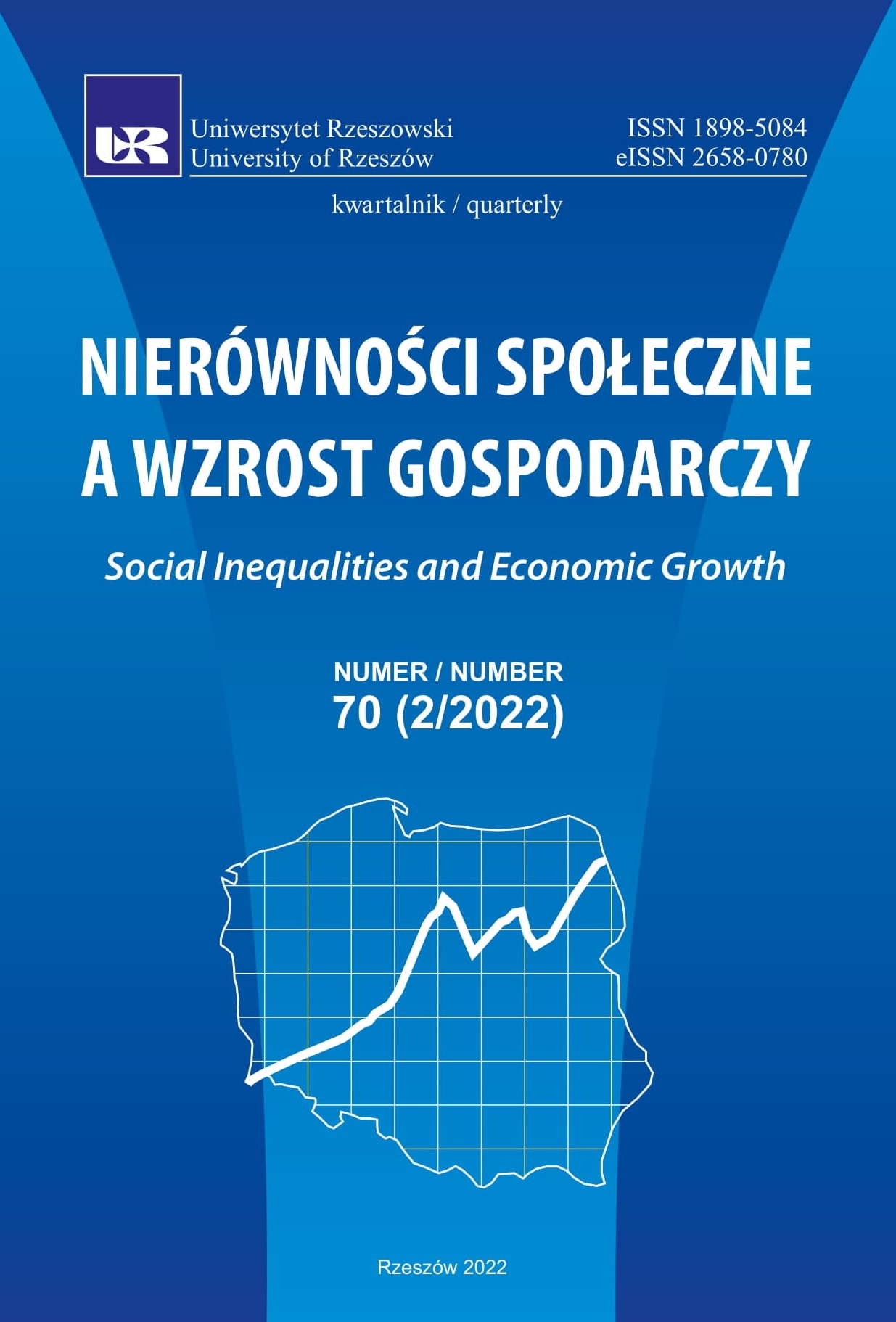Peer production: essentials and application
DOI:
https://doi.org/10.15584/nsawg.2022.2.3Keywords:
peer production, social economy, cooperation, redistributed manufacturingAbstract
The article identifies an organisational model that could face the threats posed by the modern economy. A knowledge-based economy, apart from obvious benefits, also carries threats. Implementing innovations and transforming the production of goods based on physical resources to the production of goods based on knowledge and intellectual resources requires access to appropriate assets and infrastructure. Since only a part of enterprises can afford to implement a digital transition, unequal differences between large and smaller entities stand out. Despite economic growth, inequalities may worsen and hence may lead to exclusion, especially in locations far from development areas. In the article, the author analyses the concept of peer production, an organisational model referred to as a network phenomenon. Its functioning involves the work of several people connected by a network and at the same time connected in a network. The production of (material and nonmaterial) goods in this model is based on cooperation, self-organisation of work, community building, and a focus on innovation and new technologies. The results of a literature review research methodology indicate that thanks to the features of peer production, it can reduce social inequalities and contribute to economic development. Further empirical research is needed in order to analyse practical usage and models of peer production.
Downloads
References
Algan, Y., Benkler, Y., Morell, M., Hergueux, J. (2013). Cooperation in a Peer ProductionEconomy Experimental Evidence from Wikipedia. Conference: NBER Summer Institute. SI 2013 Economics of IT and Digitization Workshop.
Bauwens, M. (2006). The Political Economy of Peer Production. Post-autistic Economics Review, 37, 3.
Bauwens, M., Kostakis, V., Pazaitis, A. (2019). Peer to Peer: The Commons Manifesto. London: University of Westminster Press.
Benkeler, Y. (2006). Common-Based Peer Production and Virtue. The Journal of Political Philosophy, 14(4), 349–419.
Benkler, Y. (2016). Peer production and cooperation. W: J. Bauer, M. Latzer (red.), Handbook on the Economics of the Internet (s. 91–119). Cheltenham – Northampton: Edward Elgar Publishing.
Benkler, Y., Shaw, A., Hill, B.H. (2015). Peer Production: A Form of Collective Intelligence. W: T. Malone, M. Bernstein (red.), Handbook of Collective Intelligence. Cambridge: MIT Press.
Braybrooke, K., Smith, A. (2020). Makerspaces and peer production: Spaces of possibility, tension, postautomation, or liberation? W: M. O’Neil, C. Pentzold, S. Toupin (red.), The Handbook of Peer Production (s. 347–358). Malden: Wiley-Blackwell.
Coase, R.H. (1937). The Nature of the Firm. Economica New Series, 4(16), 386–406.
Czetwertyński, S. (2016). Peer Production in the Internet and Unauthorized Copying of an Intellectual Property in the Bit-Torrent Network. Oeconomia Copernicana, 7(3), 501–513. DOI: 10.12775/OeC.2016.029.
Czetwertyński, S. (2019). Morfologia nieautoryzowanego kopiowania. Wrocław: Wydawnictwo Uniwersytetu Ekonomicznego we Wrocławiu.
Filippi de P. (2015). Translating Commons-Based Peer Production Values into Metrics: towards Commons-based Crypto-Currencies. W: D. Lee, K. Chuen (red.), Hand book of Digital Currency (s. 463–481). Elsevier: Academic Press.
Hendel, M. (2018). Współdzielenie w gospodarce. Syntetyczne ujęcie zjawiska. Studia Ekonomiczne, 3–4, 188–204.
Kostakis, V., Fountouklis, M., Drechsler, W. (2013). Peer Production and Desktop Manu facturing: The Case of the Helix_ T Wind Turbine Project. Science, Technology, & Human Values, 38(6), 773–800. DOI: 10.1177/0162243913493676.
Miczyńska-Kowalska, M., Slonimska, M. (2020). Network mechanisms for supporting entrepreneurially weak regions. Nierówności Społeczne a Wzrost Gospodarczy, 62(2/2020), 47–61. DOI: 10.15584/nsawg.2020.2.3.
Moilanen, J. (2017). 3D Printing Focused Peer Production Revolution in design, development and manufacturing. Acta Universitatis Tamperensis, 2298.
Ostrom, E. (2000). Collective Action and the Evolution of Social Norms. Journal of Economic Perspectives, 14(3), 137–158. DOI: 10.1257/jep.14.3.137.
Ostrom, E. (1990). Governing the Commons. The Evolution of Institutions for collective action. Cambridge: Cambridge University Press. DOI: 10.1017/CBO9780511807763.
Papadimitropoulos, V. (2018). Commons-Based Peer Production in the Work of Yochai Benkler. tripleC, 16(2), 835–856.
Pedersen, J.M., (2010). Free Culture in Context: Property and the Politics of Free Software. The Commoner, 14, 50–136.
Ramos, J. (2017). The Rise of Commons Based Economic Governance. Journal of Futures Studies, 22(1), 73–88. DOI: 10.6531/JFS.2017.22(1).A73.
Regiec, A. (2018). Amerykańska spółka corporation. Przegląd Prawa Handlowego, 6(310), 48–57.
Rogalska, E. (2014). Przedsiębiorstwo w ujęciu menedżerskich teorii firmy. Oeconomia Copernicana, 1, 153–174. DOI: 10.12775/OeC.2014.009.
Spaeth, S., Niederhöfer, S. (2021). User Motivation in Peer Production. W: M. O’Neil,
Ch. Pentzold, S. Toupin (red.), Handbook of Peer Production (s. 126–136). Malden: Wiley-Blackwell.
Speer, Ł. (2021). Peer Production: Management, Educational Application, and Their Prospects. Isletme Business Journal, 2(2), 15–27.
Steindl, J. (1945). Capitalist Enterprise and Risk. Oxford Economic Papers, 7, 21–46.
Troxler, P. (2010). Commons-Based Peer-Production of Physical Goods: Is There Room for a Hybrid Innovation Ecology?. Rochester: Social Science Research Network.
Tuziak, A. (2020a). Peryferyjność a nierówności i dysproporcje rozwojowe na poziomie regionalnym. Nierówności Społeczne a Wzrost Gospodarczy, 59(3/2019), 131–148. DOI: 10.15584/nsawg.2019.3.9.
Tuziak, A. (2020b). Social foundations of functioning and development of local communities. Nierówności Społeczne a Wzrost Gospodarczy, 62(2/2020), 309–323. DOI: 10.15584/nsawg.2020.2.20.
Verrax, F. (2019). Elinor Ostrom or the Revolution of the Commons. W: Th. Hoerber, A. Anquetil (red.), Economic Theory and Globalization (s. 195–220). London: Springer International Publishing.
Waśniewski, K.A. (2011). Decyzje inwestycyjne współczesnej korporacji – dylematy racjonalności. Kraków: Oficyna Wydawnicza AFN.
Wright, W. (2019). Temporality and Collaboration in Entrepreneurial Ownership and Finance. W: J. Reurer, Sh. Matusik, J. Jones (red.), The Oxford Handbook of Entrepreneurship and Collaboration (s. 17–34). Oxford: Oxford University Press.
Zhu, H. (2015). Essays on Achieving Success in Peer Production: Contributor Management, Best Practice Transfer and Inter Community Relationship, Submitted in Partial Fulfilment of the Requirements for the Degree of Doctor of Philosophy. Pobrane z: http://reports-archive.adm.cs.cmu.edu/anon/hcii/CMU-HCII-15-103.pdf (2022.06.29).
Downloads
Published
How to Cite
Issue
Section
License

This work is licensed under a Creative Commons Attribution-ShareAlike 4.0 International License.


